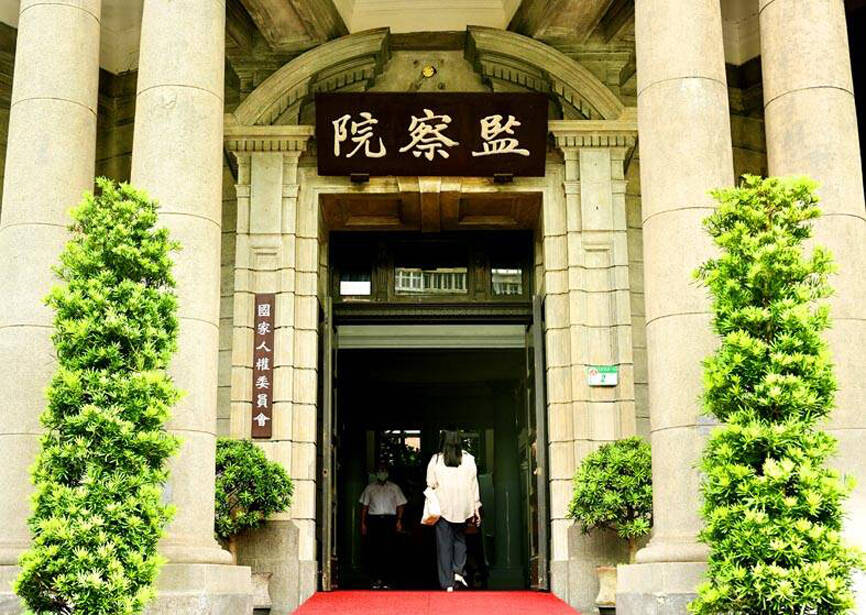The Legislative Yuan yesterday voted to establish an ad hoc committee tasked with amending the Constitution, with the aim of abolishing the Control Yuan — the government body responsible for investigating and censuring official misconduct, and impeaching public officials.
The Constitutional Amendment Committee would comprise 19 Chinese Nationalist Party (KMT) lawmakers, 17 from the Democratic Progressive Party (DPP) and three from the Taiwan People’s Party (TPP), reflecting their proportion of seats in the legislature.
The move follows a joint proposal by the KMT and the smaller TPP to amend the Additional Articles of the Constitution (中華民國憲法增修條文) to dissolve the Control Yuan.

Photo: Hsieh Chun-lin, Taipei Times
The two opposition parties argue that the body has been acting in favor of the DPP.
On June 13, TPP Chairman and legislator Huang Kuo-chang (黃國昌) said the proposal — which would transfer the Control Yuan’s presidential impeachment powers to the legislature — had secured sufficient backing to advance.
Huang wrote on Facebook that more than 29 lawmakers, exceeding the one-quarter threshold in the 113-seat Legislature, had co-signed the proposed constitutional amendment.
He also thanked the KMT for backing the bill.
Under the legislature’s rules, the Constitutional Amendment Committee is a required step in the review process for any constitutional amendment. Therefore, Huang proposed forming the committee in the current legislative term.
Legislative Speaker Han Kuo-yu (韓國瑜) said that the committee would hold its first plenary meeting at the Legislative Yuan on Aug. 25.

Taipei, New Taipei City, Keelung and Taoyuan would issue a decision at 8pm on whether to cancel work and school tomorrow due to forecasted heavy rain, Keelung Mayor Hsieh Kuo-liang (謝國樑) said today. Hsieh told reporters that absent some pressing reason, the four northern cities would announce the decision jointly at 8pm. Keelung is expected to receive between 300mm and 490mm of rain in the period from 2pm today through 2pm tomorrow, Central Weather Administration data showed. Keelung City Government regulations stipulate that school and work can be canceled if rain totals in mountainous or low-elevation areas are forecast to exceed 350mm in

EVA Airways president Sun Chia-ming (孫嘉明) and other senior executives yesterday bowed in apology over the death of a flight attendant, saying the company has begun improving its health-reporting, review and work coordination mechanisms. “We promise to handle this matter with the utmost responsibility to ensure safer and healthier working conditions for all EVA Air employees,” Sun said. The flight attendant, a woman surnamed Sun (孫), died on Friday last week of undisclosed causes shortly after returning from a work assignment in Milan, Italy, the airline said. Chinese-language media reported that the woman fell ill working on a Taipei-to-Milan flight on Sept. 22

COUNTERMEASURE: Taiwan was to implement controls for 47 tech products bound for South Africa after the latter downgraded and renamed Taipei’s ‘de facto’ offices The Ministry of Foreign Affairs is still reviewing a new agreement proposed by the South African government last month to regulate the status of reciprocal representative offices, Minister of Foreign Affairs Lin Chia-lung (林佳龍) said yesterday. Asked about the latest developments in a year-long controversy over Taiwan’s de facto representative office in South Africa, Lin during a legislative session said that the ministry was consulting with legal experts on the proposed new agreement. While the new proposal offers Taiwan greater flexibility, the ministry does not find it acceptable, Lin said without elaborating. The ministry is still open to resuming retaliatory measures against South

1.4nm WAFERS: While TSMC is gearing up to expand its overseas production, it would also continue to invest in Taiwan, company chairman and CEO C.C. Wei said Taiwan Semiconductor Manufacturing Co (TSMC) has applied for permission to construct a new plant in the Central Taiwan Science Park (中部科學園區), which it would use for the production of new high-speed wafers, the National Science and Technology Council said yesterday. The council, which supervises three major science parks in Taiwan, confirmed that the Central Taiwan Science Park Bureau had received an application on Friday from TSMC, the world’s largest contract chipmaker, to commence work on the new A14 fab. A14 technology, a 1.4 nanometer (nm) process, is designed to drive artificial intelligence transformation by enabling faster computing and greater power